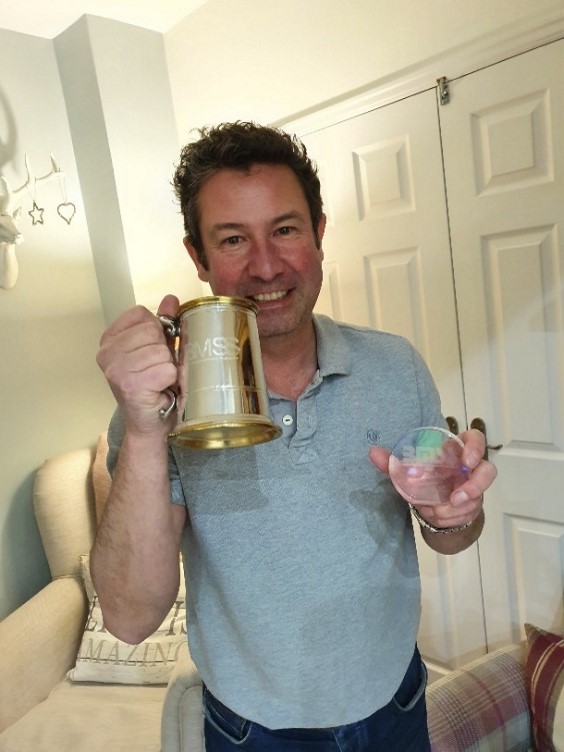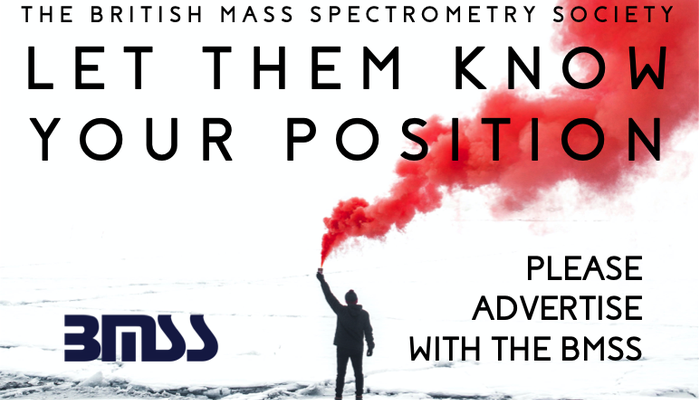Ashley Sage
Ashley Sage, Immediate Past Chair & Chair of the BMSS Advisory Board
Originally published in March 2021
How did you first get involved in mass spectrometry and then the BMSS?
My first experience of mass spectrometry was in the early 90’s when studying for my PhD. I was let loose on a then new VG/Fisons Trio 1000 GC-MS instrument which I used for the analysis of PAH’s in environmental samples. This instrument had a simple DOS based operating system, a huge 40kB of memory and was booted up using a 3.5” floppy disc! Very different from instruments today, especially around performance and computer power, but it got me started on the path of a career in mass spectrometry and subsequently instrument design and applications development. I thus started as an applications chemist at VG Micromass in Altrincham in 1997 working on single quad, triple quad and TOF mass spectrometry instruments. Since then, I have thoroughly enjoyed my career involved with the mass spectrometry industry and continue to do so. I have been fortunate to see many parts of the world, meet many talented scientists and be at the forefront of both instrument and applications development.
Regarding my involvement with BMSS, my first annual meeting was in 1999 at Reading Uni, which was a great experience from the use of mass spectrometry in scientific research but also from the ability to network with the wider mass spec community, which was growing at that time due to better commercial instruments being applied to many more applications, especially LC-MS. Since then, I have attended all but one of the Annual Meetings as they have always been a great forum to learn about the use of mass spectrometry but also a great facility to continue to meet with friends and colleagues generally over a cold beer! In 2012, I put myself forward to join the BMSS committee and joined as a General Member. Subsequently, I became Treasurer, Vice-Chair and finished my tenure as Chair of the BMSS in 2020.
During your involvement with the BMSS, what do you think are the most significant changes you have seen in the Society and in the industry?
The use of mass spectrometry has significantly expanded over the period of my career. This has been down to instrument advancements in terms of performance, design and simplification of software to allow scientists to understand more about their research in terms of better data. Mass spectrometry was generally seen as a ‘difficult to use’ technology but today’s instruments are now so powerful and generally easy to use, they have been applied to many different applications. And I am confident that the use of MS will continue to expand over the coming years as new ways to analyse samples with MS will emerge.
The BMSS has continued to keep pace with the expanding industry and it has always been there for its members in terms of providing excellent conferences and training courses for early career researchers through to experienced scientists. One exciting change is with the growth of focused Special Interest Groups (SIGs). These have expanded over time, and especially during the COVID-19 pandemic over the last 12 months have been a great way for colleagues to meet and still continue to hear about the use of MS in science, even if it has been via the new world of on-line Zoom calls! These have been greatly received and are a super way to keep the MS community in the UK engaged. Well done the BMSS committee to support and promote these key activities whilst hopefully we can all get back to some level of normal conferences in the future!
How has the BMSS evolved to reflect and adapt to these changes?
The BMSS has evolved to the ever-changing industry requirements whilst keeping the main aim of the Society and its constitution in mind. These include holding regular committee meetings to ensure the Society is run correctly and in-line with the Charity Commission; developing and expanding the SIG groups; ensuring that the Annual Meetings continue to be a great forum for our members and exhibitors; providing an excellent training course annually; providing support to students to help with their early careers through the provision of travel grants for conference attendance, and the provision of funding for summer studentships. Since the pandemic hit in 2020, the BMSS has continued to meet its commitments albeit in a digital environment along with engagement of membership through the use of a completely new website. It’s also great to see the diverse and engaged nature of the committee make-up these days which I truly believe will continue to keep the BMSS fresh and adaptable for the years to come. But of course, the BMSS continually seeks the next committee member to help drive the Society forward. If you are interested in moving the BMSS Society forward, I do hope you will consider putting your name forward!
Where do you hope to see the future of the UK mass spectrometry community?
I hope that the UK mass spectrometry will continue to grow and attract more members. The Society is constantly thinking of ways or providing better engagement, especially during this time of COVID-19, and I believe this has been apparent during the evolution of the SIG groups and the development of the on-line meetings. I’d also like to point out that the BMSS Society has always been hugely appreciative of the support provided by the instrument manufacturers and associated exhibitors over the years. Without this support, many of the activities to support the UK mass spectrometry community would have not been possible. I hope that as BMSS continues to evolve the connections between BMSS, academia, industry and analytical instrument manufacturers/suppliers the UK MS community will continue to flourish. I truly believe having these important connections is the cornerstone to success.
What are your most lasting memories of your BMSS Committee tenure?
I have many lasting memories of being part of the BMSS Committee. Firstly, it’s being part of a passionate group of scientists who give up their spare time for free to run, organize and develop the Society for the good of its members and the science where mass spectrometry is used – from students, early career researchers, academic and industry scientists. Secondly, it’s been an enjoyable journey of personal development too. I’ve learnt a lot about being a trustee of a Charitable organization, looking after the finances carefully as Treasurer and finally Chairing the Society to ensure the ship is running in the right direction – very rewarding experiences. And finally, it’s been a whole load of fun from working alongside my fellow BMSS colleagues and extended networks. Although 2020 meant that we weren’t able to hold the Annual Meeting, where I was hoping to go out with a big bang and a good old ‘knees-up’, my final and most enjoyable memory was presenting Alison Ashcroft with her BMSS Medal at the 2019 conference dinner in the spiritual home of Manchester. Slightly under the influence of red wine, having technical issues with the microphone and the fact that I couldn’t find my glasses to read my speech, I completely ad-libbed but was able to present the medal to Alison to her complete surprise.
The BMSS and UK MS community is a great place to be and long may it continue to flourish and grow. I will certainly continue to be part of it, even if my next chapter is outside the BMSS committee, and I look forward to seeing colleagues and friends over a drink or two at future Annual Meetings when life gets back to the new ‘norm’.
Acknowledgements
Ashley Sage,PhD is Senior Manager & Program Lead for Waters Advanced MS Technologies. In September 2020 he became the Immediate Past Chair of the BMSS and Chair of the Advisory Board, after his two-year term as BMSS Chair was completed.

